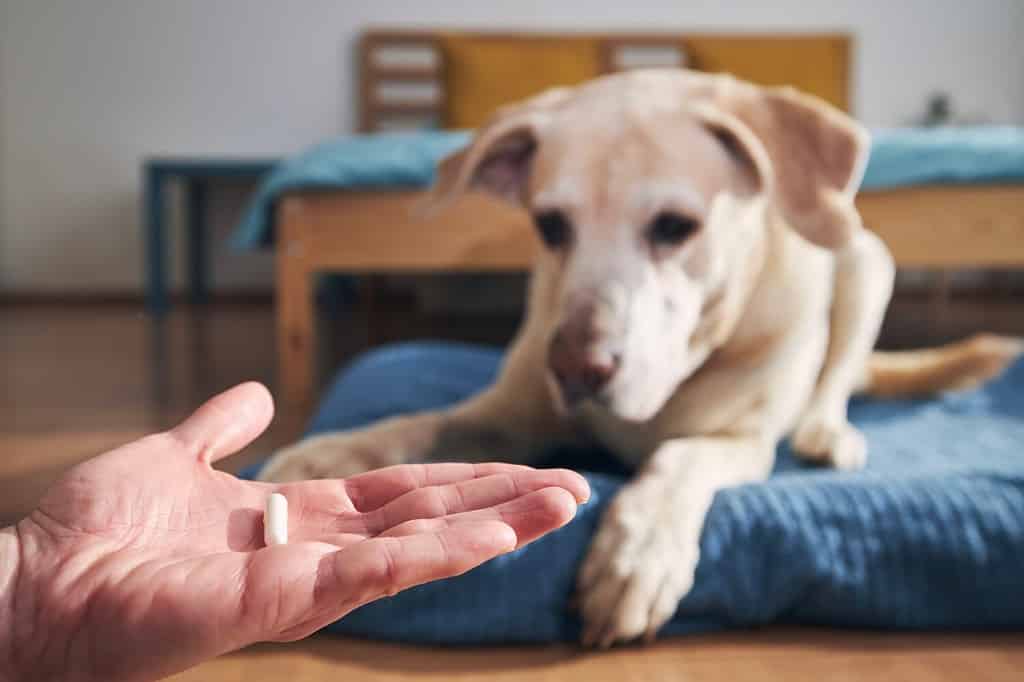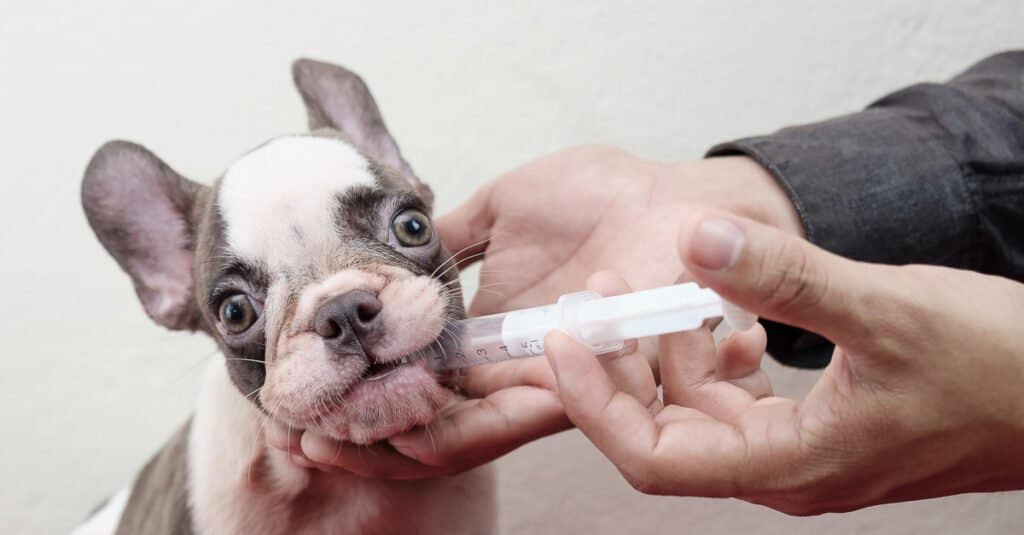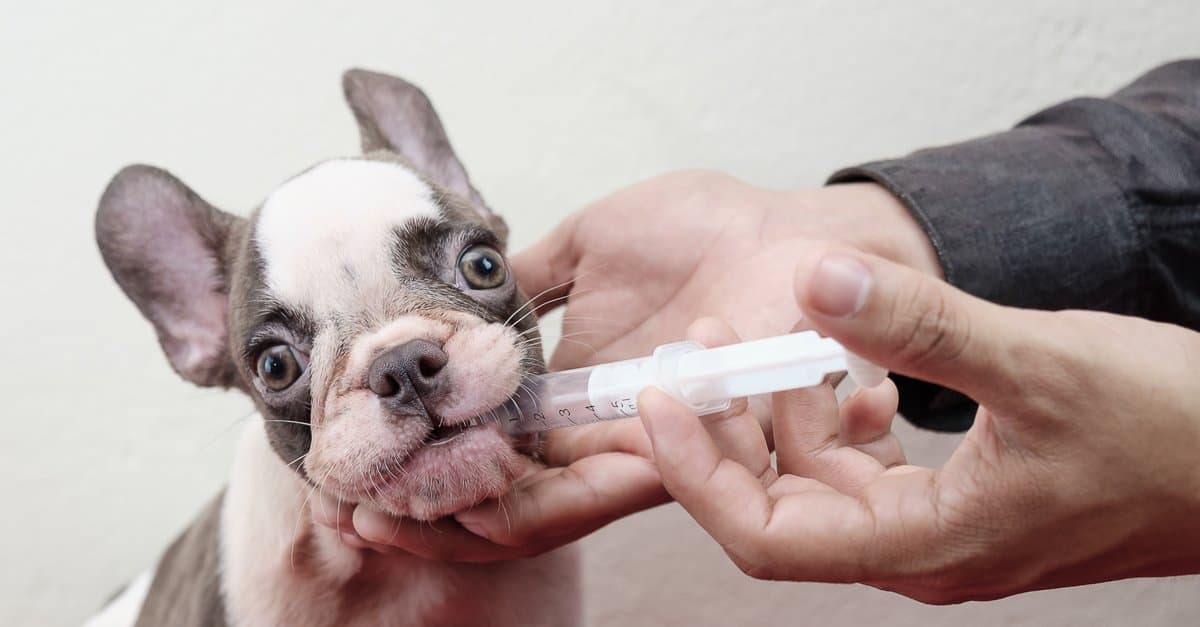Has your veterinarian prescribed Meloxidyl to your canine friend? You likely have questions about this medication and how it can help your dog. We break down everything you need to know about Meloxidyl use in dogs below, including common uses, dosing, and side effects.
What Is Meloxidyl for Dogs?

The drug Meloxidyl is a safe alternative to human NSAIDs, which lead to life-threatening complications.
©Jaromir Chalabala/Shutterstock.com
Meloxidyl is a brand name medication that contains the active ingredient known as meloxicam. Meloxidyl is a non-steroidal anti-inflammatory (NSAID) that manages a variety of musculoskeletal conditions in dogs. However, it is most commonly used to combat pain from arthritis. It can be used for acute and chronic inflammatory issues involving the musculoskeletal system.
Is Meloxidyl Safe for Dogs?
Meloxidyl is a safe medication for dogs when following your veterinarian’s guidance. Meloxidyl is a safe alternative to the use of human NSAIDs. Medications like ibuprofen and naproxen can lead to life-threatening health complications, like gastrointestinal bleeding, kidney failure, and liver failure. Unlike human NSAIDs, Meloxidyl offers relief from inflammation without the dangerous side effects.
Dr. Amy Nicole Lewis, a veterinarian with Worldwide Veterinary Services, told A-Z Animals that while Meloxidyl is safe for most dogs, it should not be offered to dogs with renal disease, liver disease, or gastrointestinal disorders. These dogs have an increased risk of adverse side effects and exacerbation of their underlying disease. For this reason, your veterinarian will likely perform blood testing before they prescribe Meloxidyl to rule out kidney and liver impairment.
Why Do Dogs Take Meloxidyl?
Meloxidyl most commonly manages inflammation from arthritis. However, it can combat other inflammatory conditions as well. Here are some of the most common uses:
- Pain and inflammation associated with arthritis
- Pain and inflammation associated with hip dysplasia
- Managing inflammation after surgery
- Inflammation seen with muscle injuries and lacerations
- Neck and spine injuries (only when steroids are not prescribed)
How Is Meloxidyl Given to Dogs?

Dogs can receive the injectable form of Meloxidyl in a vet’s office.
©Andy Gin/Shutterstock.com
Meloxidyl can be prescribed in liquid form, but it can also be administered in injectable form at your vet’s office. Meloxicam can also be found in pill form if needed, but it will not be labeled with the brand name Meloxidyl. However, it will have the same anti-inflammatory properties.
The injectable form of Meloxidyl is commonly given in a vet’s office before a surgery to combat post-operative inflammation, or it can be offered as a loading dose when a dog is experiencing significant pain from inflammation. Your veterinarian will then send your dog home with an oral form of Meloxidyl to continue. It is best to offer the dose of Meloxidyl with a small meal to prevent any nausea or vomiting after administration.
What Is the Dose of Meloxidyl for Dogs?
Before we discuss the standard dose of Meloxidyl, we should mention again that you should never give your dog Meloxidyl without your vet’s approval. With that in mind, there is a standard Meloxidyl dose that your vet will likely follow.
The standard dose is 0.2 mg per kilogram of body weight on the first day, and then 0.1 mg per kilograms of body weight in the days to follow. Each bottle of oral Meloxidyl comes with a syringe that tells you exactly how much of the medication to give for your dog’s weight range. Be sure to ask your vet how to read the syringe if you have any questions.
Are There Any Side Effects with Meloxidyl Use in Dogs?

Each bottle of oral Meloxidyl comes with a syringe that tells you how much of the medication to give.
©JOKE_PHATRAPONG/Shutterstock.com
Meloxidyl is a generally safe medication when following your veterinarian’s guidance, but just like any other medication, it can lead to a few mild side effects. Some of the most common side effects include:
- Vomiting
- Lethargy
- Decreased appetite
- Diarrhea
- Bloody stool
- Black, tarry stool
- Kidney & liver complications
Giving your dog their dose with a small meal can help decrease the risk of nausea and vomiting. However, if your dog is still experiencing any gastrointestinal upset after offering the medication with food, we suggest reaching out to your vet for guidance. Your vet may need to adjust their dosing or prescribe other medications that can protect their GI tract.
How Do I Get Meloxidyl for My Dog?
Meloxidyl is a popular medication that manages painful arthritis in our canine companions. We suggest reaching out to your veterinarian if you think your dog can benefit from the use of Meloxidyl!
Ready to discover the top 10 cutest dog breeds in the entire world?
How about the fastest dogs, the largest dogs and those that are -- quite frankly -- just the kindest dogs on the planet? Each day, AZ Animals sends out lists just like this to our thousands of email subscribers. And the best part? It's FREE. Join today by entering your email below.
Thank you for reading! Have some feedback for us? Contact the AZ Animals editorial team.








